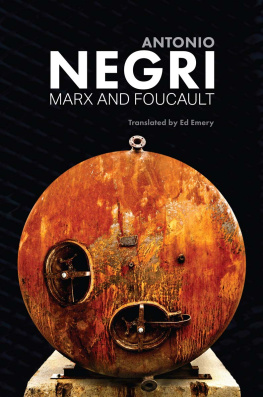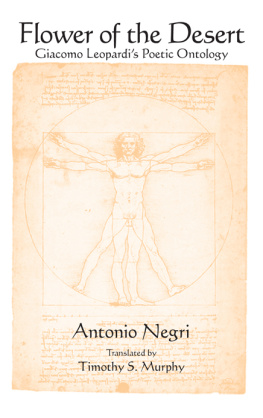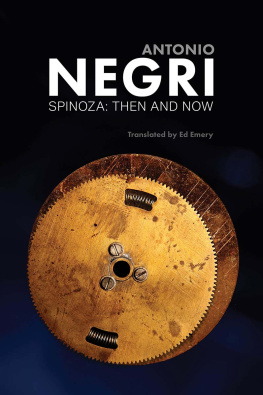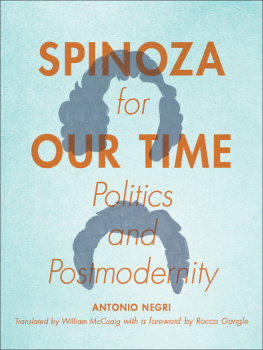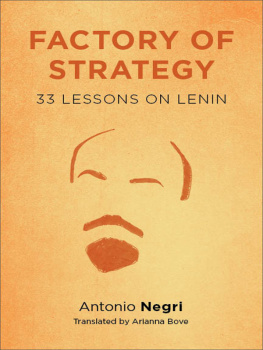Contents
Guide
Print Page Numbers

To my friends Lula, Paolo, Gian, Souzy,
Jrgen, Raniero, Romano, Mario, Alberto, Italo,
Massimo, Sergio, Guido, Francesco,
Luciano, Franco, Christian, Yann, Nanni,
Flix, Sylvie and so many, many others
Pipeline
Letters from Prison
Antonio Negri
Translated by Ed Emery
polity
Copyright Antonio Negri 2014
The right of Antonio Negri to be identified as Author of this Work has been asserted in accordance with the UK Copyright, Designs and Patents Act 1988.
First published in 2014 by Polity Press
Polity Press
65 Bridge Street
Cambridge CB2 1UR, UK
Polity Press
350 Main Street
Malden, MA 02148, USA
All rights reserved. Except for the quotation of short passages for the purpose of criticism and review, no part of this publication may be reproduced, stored in a retrieval system, or transmitted, in any form or by any means, electronic, mechanical, photocopying, recording or otherwise, without the prior permission of the publisher.
ISBN-13: 978-0-7456-8176-4
A catalogue record for this book is available from the British Library.
The publisher has used its best endeavours to ensure that the URLs for external websites referred to in this book are correct and active at the time of going to press. However, the publisher has no responsibility for the websites and can make no guarantee that a site will remain live or that the content is or will remain appropriate.
Every effort has been made to trace all copyright holders, but if any have been inadvertently overlooked the publisher will be pleased to include any necessary credits in any subsequent reprint or edition.
For further information on Polity, visit our website: politybooks.com
The remembrance is complementary to the lived experience. In it is deposited the growing self-alienation of man, who catalogues his past like a dead possession... the relic derives from the corpse, the remembrance from the dead experience, which is defined euphemistically as lived experience.
Walter Benjamin
An image is an idea through which the mind considers a thing as being present; however it indicates more the present state of the human body, rather than the nature of the external thing.
Baruch Spinoza
Pygmalion himself would not succeed in making his work believe that it possessed a life, despite all his efforts; it is only when he puts down his sculptors chisel and falls to his knees like a poor man that divinity descends upon him.
Franz Rosenzweig
Desire, which arises out of Reason, cannot have excess.
Baruch Spinoza
The dates of these letters (10 October 1981 to 7 April 1982) and the place (a special section of Rebibbia prison) are real. The text contains political and literary references and references to everyday life which are to be understood in this framework and in this time. The existence or nonexistence of references does not change the fact that the genre is one of imagination.
Translators Preface
The letters in this book were composed in prison, under trying circumstances. The text is very dense shorthand and baroque, as Negri himself admits; take for example the phrase lo stuzzichino giapponese in Letter 19, translated here Like Japanese soldiers from a war long since over. I have paraphrased where necessary and have kept explanatory notes to a minimum.
The editorial process of writing this book was somewhat unusual. As Negri explained in an interview that I did with him in 2013, in Rebibbia there were four of them in the cell Negri, Franco Tommei, and two other comrades (varying according to the vagaries of prisoners being moved between cells). Negri would write the text by hand, to provide the basic manuscript; Tommei would then type the text on a manual typewriter, chapter by chapter; and then it would be sent to the outside world.
Inevitably there were scribal errors some we have discovered only today, others perhaps will never be discovered but the book was eventually completed for publication. It emerged wreathed in tobacco smoke. As the author recalls: In the cells we were all of us smokers. We smoked all the time. That was what destroyed my lungs, with the effects that I feel today.
In accordance with my previous practice, in places where the sense suggests the French contrast between pouvoir and puissance, I have translated potere as Power (capitalised) and have generally rendered potenza as potenza, occasionally opting for potentiality where that helps the meaning.
Special thanks to Manuela Tecusan (Cambridge) and Tim Murphy (Oklahoma) for help with sourcing citations. Many of the citations were unsourced in the original letters, often taken from books that arrived in Negris cell more or less by happenstance. As the author explains: The Hofmannsthal play. Which one was it? Maybe it was Elektra. How do you expect me to remember? This was thirty years ago, and I was in prison, and I dont have the manuscript. You can tell them that in the preface.
Cambridge, 5.viii.2014
Introduction
Timothy S. Murphy
In order to understand what value Antonio Negris Pipeline has today, the reader needs to understand the significance of the books original appearance, its place in his critical development. This book was first published in Italy by Giulio Einaudi in 1983, under the title PipeLine: Lettere da Rebibbia (Pipeline: Letters from Rebibbia). Rebibbia will be explained shortly, but first things first: why Pipeline? The term appears several times in the text, perhaps most notably in the concluding lines of the fourth letter: There is energy in what I am expressing. But is my writing up to it? Energy flow a gas pipeline an oil pipeline a pipeline it is moving forward, but its filthy (, p. 14). Negri intends his letters to act as a conduit, then, not only between himself and his reader but between individual and collective, between autobiography and art, between philosophy and militancy, between past and future, and between Italy and the world.
Today Negri is well known around the world as a provocative theorist of capitalist globalisation and of the novel forms of resistance that the phenomenon has inspired. His books written in collaboration with Michael Hardt Empire, Multitude, Commonwealth and Declaration have been translated into dozens of languages and their concepts and strategies have been taken up, both for prolonged debate and for immediate use, by subversive movements in many nations. At the time these letters were written, in the early eighties, Negri was already prominent and controversial in Italy for his organising activities in workplaces and as a radical political theorist to the left of both the Communist and the Socialist Party. As he explains at the start of the sixth letter, he became actively involved in Italian left politics upon completing his formal education at home and abroad in 1959. As a professor of the philosophy of law at the University of Paduas Institute for Political Science, he was uniquely well situated to construct links between the students, who became increasingly politically active as the sixties progressed, and the industrial workers of the Veneto, who were losing patience with their political representatives in the left-wing parties. By working with his colleagues to create situations in which those groups could come together, Negri helped to cross-pollinate a counterculture that would be unmatched by any other for size, inventiveness and dedication to practical militancy. These letters tell the story of that counterculture as much as they tell Negris own story.




